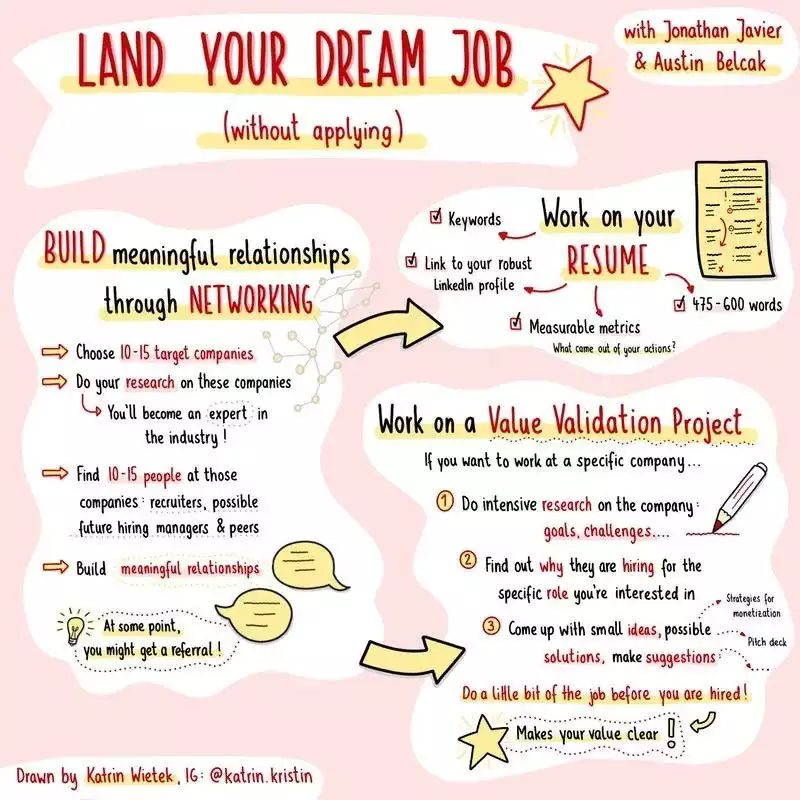SUMMARY: Discover how to find a job quicker. Competition on job boards for good jobs is fierce.
You must learn to go all out to position yourself better as a candidate with your job application.
“Since men have learned to shoot without missing, the birds must learn to fly without perching.”
Let’s explore a case study that shows how you can find a job quicker.
The case involves a first-class graduate of physics/industrial physics.
WiShe landed a job in just 60 days with the proper guidance and tools
She was jobless for nearly 13 months; she even took eight weeks off to learn some programming languages!
Having lost her last job in December 2017, Chikah P U didn’t secure another position till January 2019.
We will show you what she did differently with our guidance.
A change that made a difference and helped her find a great job in 60 days!
And why you, too, must change your job search tactics.
Be ready to embrace an unconventional strategy for getting any job anywhere!
Most people land their dream jobs a few weeks after creating their resumes with our free resume builder.
How to Find a Job Quicker ─ Winning Steps
- How to choose a specific job to focus on.
- The right way to recreate your LinkedIn profile perfectly.
- How to reach out to hiring managers and internal recruiters directly who can give you a job.
- The effective way to connect with your university alums who can refer you to existing jobs in their network of friends.
- Creative ways to work on your CV to highlight the ‘wow’ factor.
- How to write an interview-winning cover and ‘polite letters’ that appeal to people on an emotional level to help you willingly.
And other things that will transform your job search situation and make it more intelligent and faster.

Like this post?
Sign up for our blog updates and never miss a post. We’ll send you A FREE job interview eBook as a thank-you.
We Must Approach Job Search In A New Way
Often, we can trace the inability of new graduates to find a suitable job upon graduation to their time at university.
They spent all their time on academics while at university.
Many leave job search tasks until they have graduated!
That’s too late.
It’s one of the most significant contributors, if not the biggest, to unemployment after graduation.
You can hardly expect to get a job you didn’t prepare for earlier.
It is frustrating to see graduates who worked so hard to earn their degrees but are now unable to find jobs.
Meanwhile, there are plenty of jobs!
The education system and how it trains candidates must take substantial blame.
Yet, most students still concentrate on reading for their degree.
Universities don’t correctly guide their students to think seriously about the post-university world of work.
And how they will get appropriate jobs upon graduation.
So, pay attention because applying these principles and the processes to your job-hunting can help you escape post-graduation unemployment quicker!
Let’s dive in…Shall we?
The Job You Want
Let’s be frank. There’s no point in searching for a job called ‘anything’ or even two to four jobs simultaneously.
Instead, you can just focus on one job at a time.
However, how do you know the job to pursue?
First, most graduates confuse their academic disciplines with real-world jobs.
A bachelor’s in computer science is different from a front-end or back-end developer.
The former is academic and often too theoretical.
The latter is a practical, real-world job title that offers gainful employment if you have the expertise, technical ability, and experience.
Chikah needed clarification about which job to search for in our case study.
IT Help Desk Analyst, IT Technical Support, or Customer Support Officer.
All roles that she had previously worked in for nine months at Chevron.
We explored what job role she would like to work in, considering her knowledge, experiences, and personality.
She said, “I would love to be a Software Developer.” So, it was clear.
Second, she researched to understand what skill set was required to become a Software Developer.
Third, Chikah started a short training course in coding, including CSS, HTML, Python, R, database management, and other programming languages.
She picked it up incredibly fast.

Creating A Winning LinkedIn Profile
Before you can connect with alums or others, you must fix your LinkedIn profile to the highest possible standard in your job search.
Use our free LinkedIn profile builder (we also have a resume builder) to create your summary and headline.
You’ll make a great first impression, and recruiters will remember you.
The image you want people to have of you must be professional.
You’ll need to be able to present this well on your LinkedIn page.
Chikah made the usual mistakes as most job seekers do on their LinkedIn profile:
- No clean headshot or cover image
- Confusing headline
- Poorly-written summary that didn’t consider the clients but concentrated on her, the “I am a self-motivated, highly ambitious…” type.
Her profile wasn’t optimized, either!
We corrected all these issues, completed her work experience section, and added achievements.
Next, she added at least two colorful images in the Job Experience and Educational Section.
We then showed her how to request recommendations and endorsement of skills.
And how to join LinkedIn’s special interest groups.
The final step was to change her LinkedIn URL to a custom name.
Read More
- About How to Fix Your LinkedIn profile
- Free online CV builder
- Free resume scanner
- Online resume builder
- How to get a job
- Putting work experience section in a CV the right way
Chikah’s Wow Factor
Most inexperienced job seekers and graduates write poor CVs that do not attract the attention of potential employers or recruiters.
In the last 30 months, we have reviewed at least 2,350 CVs for Star Jobs Recruitment, London.
Let me tell you what we look for in good CVs to pass them on to the hiring manager:
- Do you live locally (or did you indicate that you are “willing to relocate”)?
- Is there a wow factor in the CV?
- Do you have the relevant experience required?
- Are there employment gaps in the CV (and are they explained)?
- How does the CV look (i.e., layout, formatting, how appealing it is)?
With Chikah, we worked on these and other critical aspects of good CV writing.
Discover More
Meanwhile, you can view the screenshot of her sample CV later in this article (the CV has been edited to protect her identity).
Connecting With Alumni, Recruiters, And Potential Employers Directly
If you can do this well, with minimum effort, it can be the quickest way to get a job.
That’s what happened to Chikah.
The silver lining is in knowing how to build some level of friendship. This is because:
“Human beings help friends, not contacts.”
Courtney Connley, CNBC
Chikah identified the alums of her university on LinkedIn (www.linkedin.com/alumni)
Next, she selected those working in the IT sector, although people working in other sectors can also help.
We’ll show you her initial connection request message shortly.
A very personalized message indeed!
But first, let’s examine her alum page.
Alumni Page & Connections
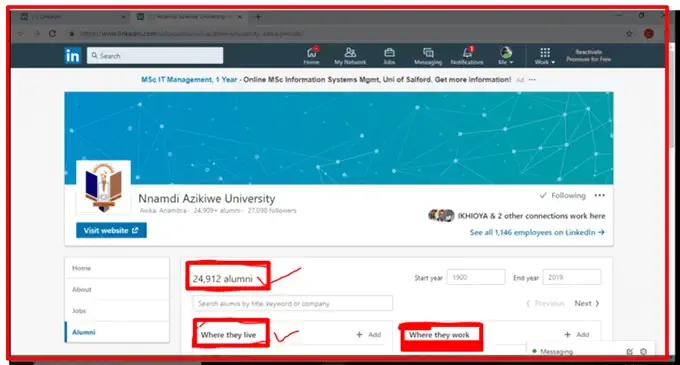
This screenshot shows there were 24,912 of her university’s alumni on LinkedIn.
You can select to view by:
- where they live
- where they work
- job title
- sector
- what they studied
- and when they graduated
Chikah then used our template and sent a personalized request to the alums working in the IT sector, her area of interest.
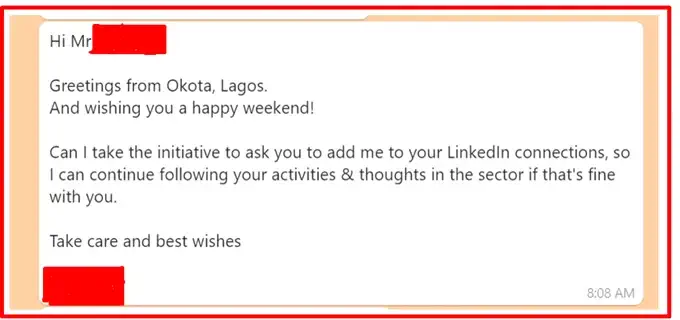
Networking
So, she sent this request to hundreds of her alums.
Almost every alumnus accepted her request.
Chikah then sent a follow-up message, and interactions would start happening back and forth in a very conversational manner.
It’s from having these kinds of fluid conversations with her alums that she saw opportunities opening up for her.
Also, she kept track of her new connections.
Below is an example of how to do this:
![]()
She recorded everything to help her in the follow-up exercise.
Meanwhile, her alum connections spanned all sectors and different top companies in Nigeria, including oil and gas.
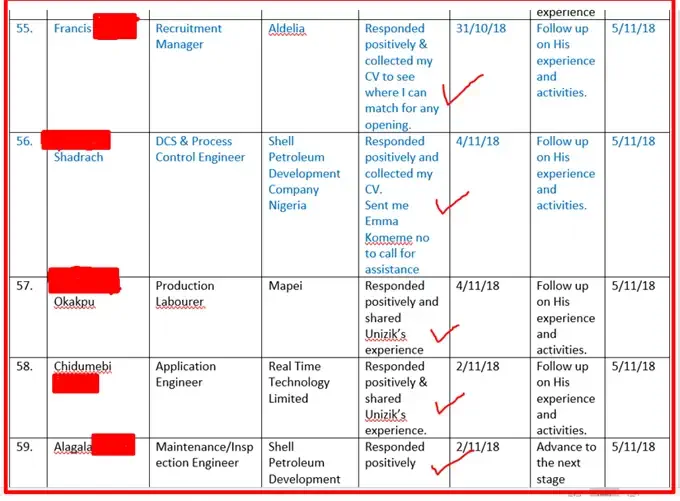
Apart from that, Chikah identified more than 20 companies that employ software developers.
She then researched and found their HR managers and connected with them directly.
Most of the HR managers would request her CV immediately.
The others would accept her CV after a few exchanges.
Chikah followed up as well.
Networking With HR Managers Directly
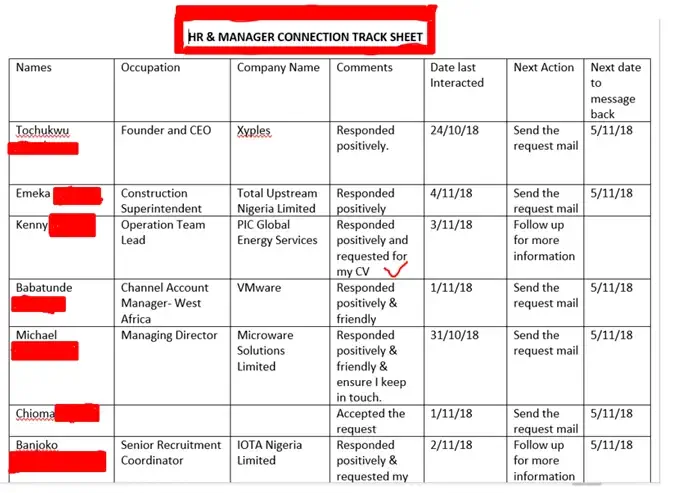
Keeping track of the connections helped her to concentrate on the most critical alums and HR managers to follow up with.
She maintained the momentum.
Because of this unique way of reaching out to so many alums, many opportunities opened for her.
She started receiving referrals, pledges, and commitments from people who vouched to assist further.
Alums were falling over themselves to help her to get a job in the IT sector.
Some offered her free training and materials as well as professional advice.
Below are some incredible conversations and promises from alums:
She had concrete commitments from alums who promised to assist her in finding a job.
This would never have happened without the spirit of camaraderie that only alums can spark!
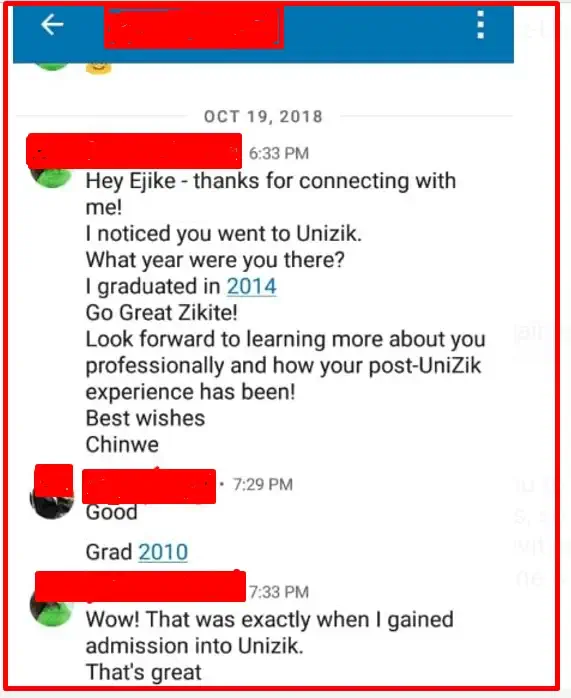
Another robust conversation- an unconventional way of finding a job
When you know how to connect this way, you see that people are willing to help.
Most notably when you have first contributed to the new friendship.
Chikah’s CV, Interviews, And Preparation
Suddenly, someone who had received no invitations to interview in the last 12 months started getting invitations.
What had changed?
We showed her an unconventional but highly effective strategy to find a job ─ and she acted on it!
Chikah also worked on her CV and cover letter.
Discover More
- How to Write Interview-Winning CVs
- Cover Letters
- Get job referrals with ease
How to write a resume like a pro
She implemented our proven strategy, and here is a draft of her CV that got her interviews.
[Personal details have been edited for privacy]
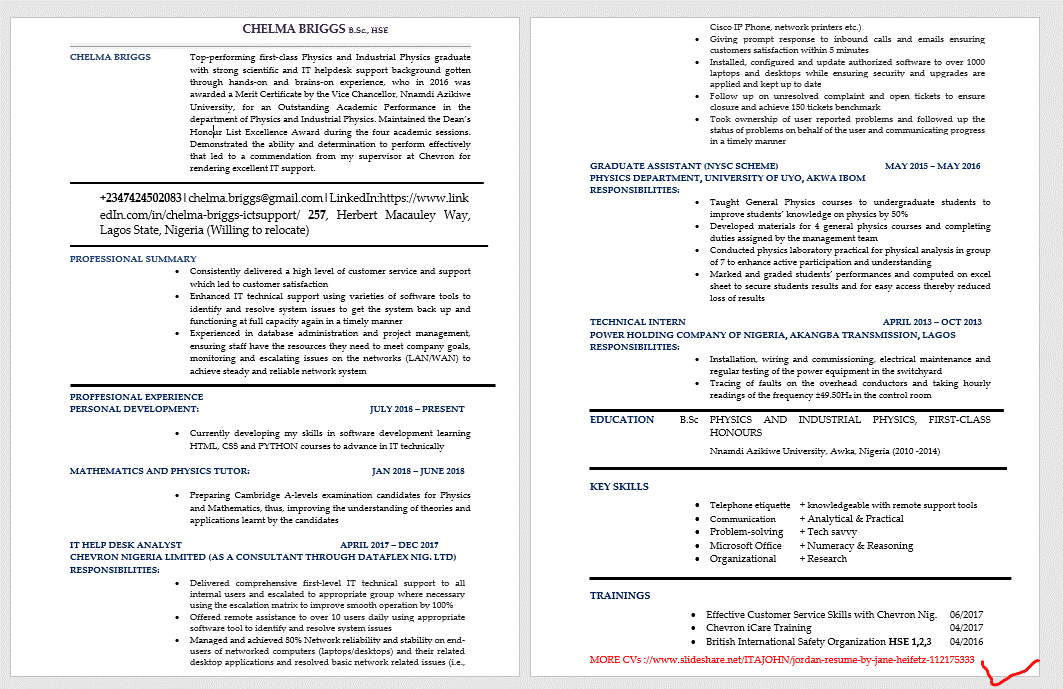
Another critical success factor, in this case, was the ‘Polite Letter’ that we developed with her.
She sent this to HR managers and alums. This was her ‘plea for help.’
It connected her with people on a profoundly emotional level, much better than a mere ‘Can you give me a job’ request.
The technique yielded many positive results.
Interviews
She also trained in interview success principles.
Chikah watched our videos which analyzed and provided helpful tips on how to find a job.
She also mastered answering seven critical categories of interview questions.
Seven key interview areas:
- Personality (will you fit in?)
- Aspirations (why do you want the job?)
- Behaviours (can you cope with stress?)
- Competency (are you able to do the job?)
- Ethics (would you bend the rules?)
- Management (what is your management style?)
- Self-motivation (are you energized and focused?)
Here is another helpful strategy she used.
She developed a 30-60-90-day plan which she then took to her interviews.
This plan is a document you can develop based on the job description.
It is best if you take it to an interview.
The plan indicates what you’ll do within 30, 60, and 90 days to add value to the organization if they employ you.
It’s a winning formula!
Finally, Chikah landed a developer job early in February 2019 with an IT services firm in Lagos, Nigeria.
Conclusion
Imagine if Chikah had access to the knowledge and career support narrated above (on how to find a job) during her university years.
Perhaps, it would have saved her the pain of an extended period of unemployment, even with a first-class science degree, which is appalling.
Landing a well-paid job upon graduation depends on what you do.
And how much you put into your post-university job preparation while studying.
Job search success can depend on many factors:
- Internships, placements, relevant part-time jobs, volunteering, insight weeks (if you’re a UK resident).
- Short and targeted skills development training in the areas of your chosen real-world job you undertake.
- Any work placements
- Relevant certifications earned
To not do any of these before graduation and then start writing an empty, no-experience CV afterward is a sorry situation!
Therefore, the more these activities you undertake, the higher your chances of having a fantastic CV ready!
How can CVJURY help you to find a job quicker?
Discover how we can train you using this approach, and others, to get a job faster!
It’s more effective than applying to an online job board where the competition continues to be fierce.
Our job search training has a 100% success rate, and we will work with you until you receive your new job offer!
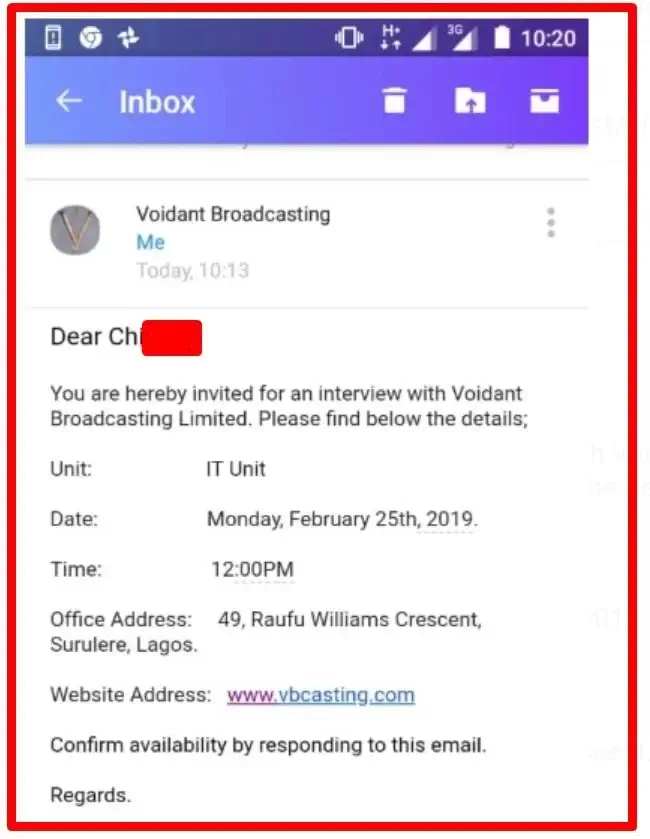
By the way, even though she has a job now, Chikah still receives interview invitations based on previous applications she submitted.
…..
